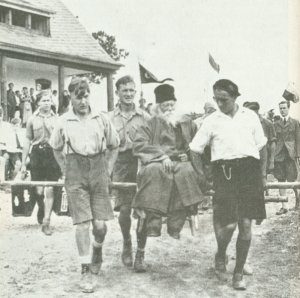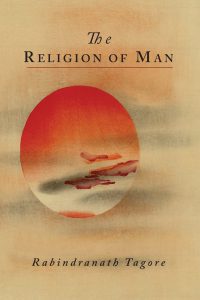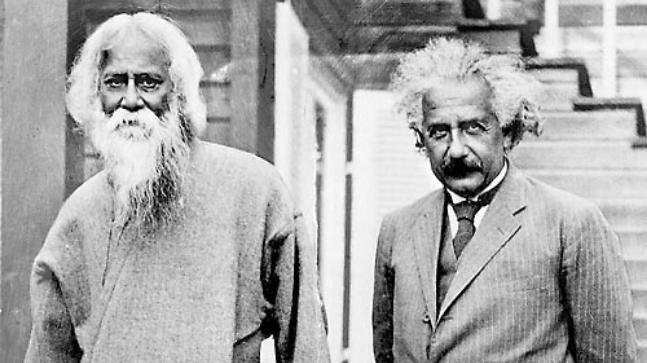Reading Time: 8 minutes

Tagore’s meetings with Einstein which took place in 1930 and which elicited reactions, both respectful and not-so-respectful, from the scientific community were significant if only because of the opportunity they offered to two great minds of the modern age to know each other. The apparent dissonance between the temperament of a poet and that of a scientist renders such a meeting unlikely in the first place, leaving little possibility of positive gain on either side. Tirthankar tells us about this unique relationship, exclusively for Different Truths.
Rabindranath Tagore evinced throughout his life a degree of interest in science and its achievements which was remarkable, given the predominantly romantic nature of his poetic sensibility. The beauty and the sheer splendour of the natural landscape of Bengal quickened his poetic powers in his early youth which flowered, with the passage of time, into an exquisite sensitivity towards Nature. It is commonly held, perhaps not without reason, that a poet should fight shy of scientific inquiries into the whys and wherefores of the natural phenomena, as these may well rob him of his capacity for instinctive response to their beauties. Wordsworth’s famous complaint that the “meddling intellect/ Misshapes the beauteous forms of things” and that it murders to dissect was characteristic of his time in more ways than one. It reflects a sense of uneasiness about the progress of science at the cost of nature and its possible implications for the emotional life of man in the context of industrial revolution. Wordsworth’s rather grudging admission in his famous Preface that the future poet might be called upon to find some means to accommodate in his poetry references to scientific inventions reflects, on the other hand, an endeavour to come to terms with the changing times.
 Tagore belonged to a juncture of Indian history when, thanks to the exposure to Western civilisation, there occurred in the life of the Indian people a momentous cultural upheaval. The traditional Indian life, accustomed to faith rather than reason, suffered a jolt owing to a new interest in rationality. It is in this context that Tagore’s differences with Gandhi on the issue of the earthquake should be seen. Disturbed by the continued adherence to the practice of untouchability in Bihar, Gandhi attributed the earthquake of 1934 to the wrath of God, which Tagore, for all his reverence for the great leader, deeply resented for its possible effect on the Indian psyche: “It is all the more unfortunate because this kind of unscientific view of [natural] phenomena is too readily accepted by a large section of our countrymen” (Sen: 104). It is this scientific temper which distinguishes Tagore as a poet and sets him apart from other romantic poets of his time. His passionate support for Sir Jagadish Chandra Bose’s scientific discoveries is another evidence of his scientific outlook.
Tagore belonged to a juncture of Indian history when, thanks to the exposure to Western civilisation, there occurred in the life of the Indian people a momentous cultural upheaval. The traditional Indian life, accustomed to faith rather than reason, suffered a jolt owing to a new interest in rationality. It is in this context that Tagore’s differences with Gandhi on the issue of the earthquake should be seen. Disturbed by the continued adherence to the practice of untouchability in Bihar, Gandhi attributed the earthquake of 1934 to the wrath of God, which Tagore, for all his reverence for the great leader, deeply resented for its possible effect on the Indian psyche: “It is all the more unfortunate because this kind of unscientific view of [natural] phenomena is too readily accepted by a large section of our countrymen” (Sen: 104). It is this scientific temper which distinguishes Tagore as a poet and sets him apart from other romantic poets of his time. His passionate support for Sir Jagadish Chandra Bose’s scientific discoveries is another evidence of his scientific outlook.
Tagore’s meetings with Einstein which took place in 1930 and which elicited reactions, both respectful and not-so-respectful, from the scientific community were significant if only because of the opportunity they offered to two great minds of the modern age to know each other. The apparent dissonance between the temperament of a poet and that of a scientist renders such a meeting unlikely in the first place, leaving little possibility of positive gain on either side. That Tagore and Einstein met more than once and engaged each other in a discussion of issues of profound interest to both testified to their having shared some common ground.
Before his first meeting with Einstein in 1926, Tagore had visited Germany in 1921, when he was  enthusiastically received by a nation still reeling under the impact of the First World War. The young men and women turned to him at that time for the philosophical solace against the devastating power of modern science. To them, Tagore was a seer, a prophet of oriental wisdom, who kindled faith in the perfectibility of man. This established for the people of Germany Tagore’s credentials as a philosophical poet. The mystique that surrounded his image in the consciousness of the western readers did arguably more harm than good to his reputation as a poet, replacing in the popular mind the image of a quintessential poet with that of a philosopher. So, when a decade later, Tagore and Einstein met each other again face to face, their discussion naturally veered towards philosophy, although the perspective that each of them brought to bear upon his view of things was typically that of a poet, on the one hand, and a scientist, on the other.
enthusiastically received by a nation still reeling under the impact of the First World War. The young men and women turned to him at that time for the philosophical solace against the devastating power of modern science. To them, Tagore was a seer, a prophet of oriental wisdom, who kindled faith in the perfectibility of man. This established for the people of Germany Tagore’s credentials as a philosophical poet. The mystique that surrounded his image in the consciousness of the western readers did arguably more harm than good to his reputation as a poet, replacing in the popular mind the image of a quintessential poet with that of a philosopher. So, when a decade later, Tagore and Einstein met each other again face to face, their discussion naturally veered towards philosophy, although the perspective that each of them brought to bear upon his view of things was typically that of a poet, on the one hand, and a scientist, on the other.
The discussions remained centred by and large on the nature of reality and the relationship of determinism and free will. Tagore was arguing mainly from the ground of Indian philosophy while for Einstein the debate touched upon an issue that was intimately bound up with a scientific outlook. The latter’s view of Nature as a ‘reality’ independent of a human observer had already entered some rough weather with Bohr, among other scientists, contesting this view in terms of the Copenhagen interpretation of the quantum theory: “The laws of nature which we formulate mathematically in quantum theory deal no longer with the elementary particles themselves but with our knowledge of the particles” (Heisenberg) (Home and Robinson: 173).
Unwittingly, Tagore had broached a topic that had already become a bone of contention between Einstein and some of his fellow scientists. To the Indian poet, however, Einstein’s scientific theory reflected an idea of the universe that seemed unacceptable. The idea that nature is something ‘out there’ being governed by laws inherent in itself does not contradict the presence of man who exists as the observer and the interpreter of these laws. What Tagore might have found particularly difficult to accept, however, is the scientist’s absorption in the study of nature to the exclusion of man. The basic temperamental difference between a poet and a scientist becomes apparent in the following exchange of opinions:
E: There are two different conceptions about the nature of the universe – the world as a unity dependent on humanity, and the world as a reality independent of the human factor…
T: This world is a human world – the scientific view of it is also that of the scientific man. Therefore, the world apart from us does not exist; it is a relative world, depending for its reality upon our consciousness.
 The basic point of difference, however, is philosophical. For Tagore, to accept Einstein’s position would be tantamount to an abrogation of an article of faith. All his life Tagore felt in his being the power of the universe that pressed upon his consciousness from all sides bringing to his troubled soul the ministrations of nature. His mind registered the intimations of the natural world even at a time when he lacked the power to grasp the inchoate emotions and translate them into poetry. He reminisces about that phase of his life in The Religion of Man:
The basic point of difference, however, is philosophical. For Tagore, to accept Einstein’s position would be tantamount to an abrogation of an article of faith. All his life Tagore felt in his being the power of the universe that pressed upon his consciousness from all sides bringing to his troubled soul the ministrations of nature. His mind registered the intimations of the natural world even at a time when he lacked the power to grasp the inchoate emotions and translate them into poetry. He reminisces about that phase of his life in The Religion of Man:
The shrill, thin cry of the high-flying kite in the blazing sun of the dazed Indian midday sent to a solitary boy the signal of a distant kinship. The few coconut plants growing by the boundary wall of our house, like some war captives from an older army of invaders of this earth, spoke to me of the eternal companionship which the great brotherhood of trees has ever offered to man. (Qtd. in Chaudhuri 146)
As he grew up, the notion of give and take between man and nature formed the kernel of his aesthetic theory. The idea is of a piece with the philosophy of the Romantic poets of nineteenth-century England with whom Tagore felt a distinct emotional affinity. As Coleridge would put it,
O, Lady! We receive but what we give,
And in our life alone does Nature live:
Ours is her wedding garment, ours her shroud! (‘Dejection: An Ode’)
The somewhat laconic responses, on the part of Einstein, due, perhaps, to his use of native tongue rather than English, might have produced in some corners the impression that the scientist did not warm up to the poet and that the two were talking past each other. The fact that Einstein could relate the divergence of opinion to their respective vocations is clear from the way he invoked the subject of beauty as the typical domain of a poet:
E: Truth, then, or beauty, is not independent of man?
T: No.
E: If there were no human beings anymore, the Apollo Belvedere no longer would be beautiful?
T: No.
E: I agree with regard to this conception of beauty, but not with regard to truth.
T: Why not? Truth is realised through men.
***
E: I cannot prove my conception is right, but that is my religion.
One wonders if the scientist has in my mind the title of Tagore’s Hibbert lectures (‘The Religion of Man’) delivered a few months before this meeting.
The discussion soon turned to the subject of truth per se and Tagore countered Einstein’s reference to the ‘Pythagorean argument that the truth is independent of human beings’ by referring to the Upanishadic philosophy of ‘Brahman, the absolute truth, which cannot be conceived by the isolation of the individual mind or described by words, but can be realized only by merging the individual in its infinity’. Although Tagore was speaking with the authority of conviction, it is doubtful if this metaphysical concept made any impression on Einstein who continued to uphold his idea of truth as being independent of man.
The exchange of opinions which took place on the afternoon of July 14, 1930, has since been much discussed and commented upon. For the readers of Tagore’s poetry, however, its value lies in the prose gloss provided here by the poet himself on one of the cardinal themes of his own poetry. The following lines chosen at random are informed by the same faith in the organic relationship between man and nature that marked Tagore’s views in that conversation:
The same stream of life that runs through my veins night and day runs through the world and dances in rhythmic measures.
It is the same life that shoots in joy through the dust of the earth in numberless blades of grass and breaks into tumultuous waves of leaves and flowers.
It is the same life that is rocked in the ocean-cradle of birth and death, in the ebb and in the flow.
I feel that my limbs are made glorious by a touch of this world of life. And my pride is from the life-throb of ages dancing in my blood this moment. (Quoted in Ghose pp.45-6).
Since the poet and the scientist shared a common interest in music, their conversation also touched upon this area of artistic experience, which, in their case, was inevitably conditioned by their upbringing within different musical traditions, oriental and occidental. Tagore spoke, in the main, on the degree of freedom granted to a singer in the Indian musical tradition in improvising melodic flourishes within the strict boundaries of a raga. Einstein while remarking about the distinctiveness of the European tradition underscored the importance of subjectivity in all human responses.
this area of artistic experience, which, in their case, was inevitably conditioned by their upbringing within different musical traditions, oriental and occidental. Tagore spoke, in the main, on the degree of freedom granted to a singer in the Indian musical tradition in improvising melodic flourishes within the strict boundaries of a raga. Einstein while remarking about the distinctiveness of the European tradition underscored the importance of subjectivity in all human responses.
Einstein: The same uncertainty will always be there about everything fundamental in our experience, in our reaction to art, whether in Europe or in Asia. Even the red flower I see before me on your table may not be the same to you and me.
The difference in opinion never proved an impediment to an abiding friendship
Acknowledgement
Chaudhuri, B.M. ‘The Poet’s Religion’ in Homage to Rabindranath Tagore: In Commemoration of the Birth Centenary of Rabindranath Tagore.
Ghose, Sisirkumar. Rabindranath Tagore.
Home, Dipankar & Andrew Robinson. ‘Einstein and Tagore: Man, Nature and Mysticism’ in Journal of Consciousness Studies: controversies in science and the humanities, vol. 2. no.2. 1995
Sen, Amartya. The Argumentative Indian: Writings on Indian History, Culture, and Identity.
https:schoolofwisdom.com/about/rabindranath-tagore-one/tagore-and-einstein/ accessed on 28.04.18
Photos from the Internet
#TagoreAndEinstein #EuropeTripOfTagore #TaogreAndMusic #NatureLover #VisitToGermany #TributeToTagore #DifferentTruths














